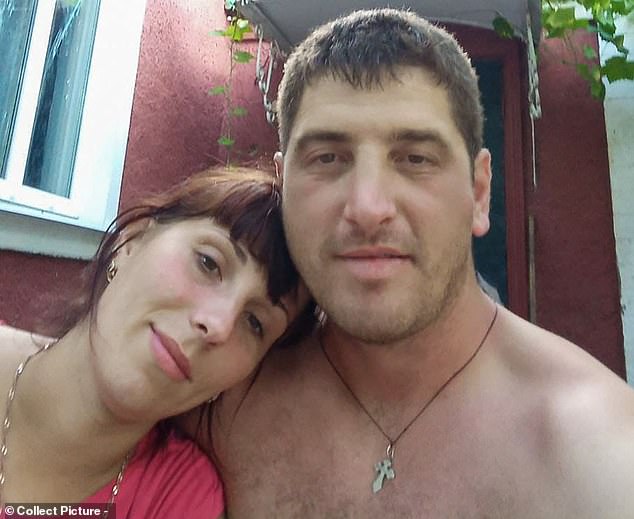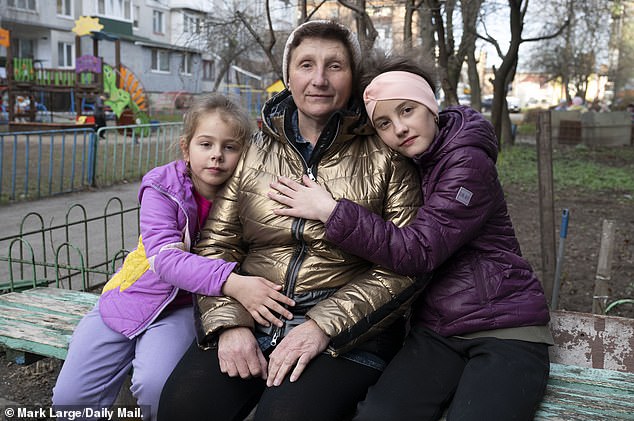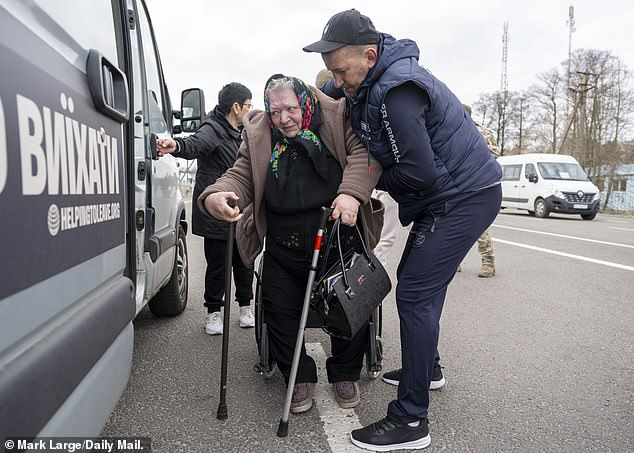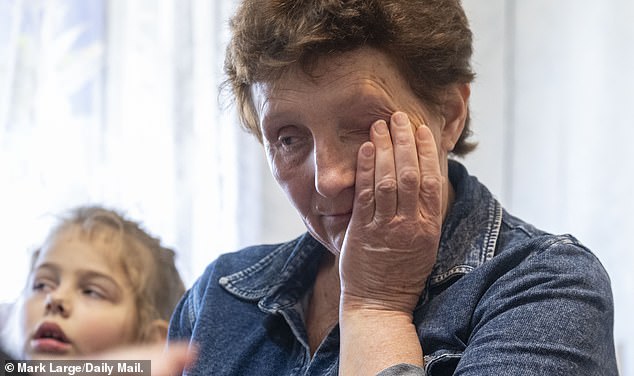Just hours after the full-scale invasion of Ukraine in early 2022, Russian forces reached Kateryna and Maryna’s hometown and tortured their uncle for being a member of the local resistance.
Weeks later, they dragged their auntie into a blood-soaked interrogation room for questioning over comments she had been overheard making against the invaders.
Neighbours were rounded up and executed at random. Drunken soldiers would fire tanks on the local houses for fun.
Then, a Russian artillery strike killed the little girls’ father, Oleh, on his 33rd birthday – June 16, 2023. Shrapnel from the same blast tore both legs from their mother Oleksandra, 25, who bled to death waiting for a Russian ambulance – with medics more interested in covering up the war crime than treating her.
Aged just seven and ten, the sisters were left to live with their maternal grandmother Oksana, 59, and remained prime targets for Moscow – not just in the daily shelling and drone strikes on their neighbourhood ten miles inside Russian-occupied territory, but also as part of Russia’s campaign to steal thousands of Ukrainian children.
Indeed, if their grandmother were just a few years older, the Ukrainian sisters would now be entirely at the Russians’ mercy.
In occupied territory, once any family member caring for a young child is over 60, the authorities favour placing the youngster in state-run orphanages or putting them up for adoption in Russian homes, rather than granting that family member custody. It is a policy being ruthlessly exploited in a systematic drive to erase Ukrainian identity.
It took Oksana 18 long months to gain the necessary paperwork to make herself the legal guardian of the girls – who already had Russian birth certificates.
Only once she had attained this stamp of approval did she make a dangerous and circuitous 1,600-mile journey from the occupied Kherson region in the south of the country to reach an area of Ukraine not ruled by Russia. A journey that ended at the last open humanitarian corridor where she could make a crossing, far to the north-west of the country in the town of Domanove on the Belarusian border.
‘I won’t forgive them,’ the determined grandmother said of the invaders on finally reaching unoccupied Ukrainian soil again.
Yet she and her granddaughters – whose names we have changed for their own protection – are among just the lucky few who managed to escape. There are more than three million Ukrainians still living in occupied territory.

Neighbours executed at random, and drunken soldiers would fire tanks on the local houses for fun. Then, a Russian artillery strike killed the little girls’ father on his birthday
The Daily Mail travelled to the Domanove crossing point to hear the horrifying realities of life for Ukrainians under Russian rule in occupied territory. Realities that, thanks to the new administration in Washington, Putin is on the cusp of making permanent.
Two weeks ago he signed a decree with the bombastic title: ‘On the Peculiarities of the Legal Status of Certain Categories of Foreign Citizens and Stateless Persons in the Russian Federation’.
In short, it gives Ukrainians in occupied territory until September to take Russian citizenship – or be forced from their homes.
Chillingly, in this endeavour he appears to have the tacit support of Donald Trump’s peace envoy Steve Witkoff. Just last month Mr Witkoff said families like Oksana’s have ‘indicated that they want to be under Russian rule’ by an ‘overwhelming majority’.
He was referring to a ‘referendum’ in September 2022 – recognised only by North Korea, until Mr Witkoff’s apparent endorsement – where votes were either falsified or collected at the barrel of a gun (other than those of a shameful yet significant minority of collaborators).
Mr Witkoff has met Putin in Moscow and, this week, held talks with Putin’s favourite negotiator, Kirill Dmitriev, in Washington – the first time a senior Russian official has attended discussions in America since the invasion.
Yet he has not deigned to visit Ukraine. If he did, just one day at Domanove might change his view.
What we witnessed here is just a snapshot of the suffering and humiliation that Moscow’s war machine is inflicting on Ukrainians trapped in occupied territory.
‘There were executions right from the first day,’ said Oksana. ‘One woman’s parents hid in their basement. They found them, and then they were shot – both father and mother, shot in the head,’ she said. ‘They took children. The Russians break in wherever they want. They take cars, they take everything. Whatever they like, they take.’
Cuddling her granddaughters to her and wiping away tears as she spoke of them, this extraordinarily resolute woman added: ‘Even though I love them, no one can replace parents. No one – not at such a young age.’
We spoke to another grandmother who had to flee occupied territory with her grandson just days after his parents were killed by Putin’s forces. Hours after their deaths, Russian officers had arrived at her home and demanded custody of the ten-year-old, as she was over 60.
She pleaded with Russians to let the boy attend his mother’s and father’s funeral before handing him over, and they agreed.

Aged just seven and ten, the sisters were left to live with their maternal grandmother Oksana, 59, and remained prime targets for Moscow

We spoke to another grandmother who had to flee occupied territory with her grandson just days after his parents were killed by Putin’s forces
But she had no intention of letting him witness the service.
Instead, she contacted a network of drivers who specialise in evacuating Ukrainians from occupied territory. They launched an immediate and daring rescue mission to smuggle both of them out. She was still too traumatised by her ordeal to speak at length, and had not been able to explain to the boy what had happened to his parents.
Each day, about a dozen Ukrainians cross over at Domanove, after making the journey north.
As the front lines through south-east Ukraine are closed to civilians, they must travel exclusively through enemy territory – first to the ruined Russian-held southern city of Mariupol, and on into the mostly conquered region of Donbas.
They then go up through Russia itself towards Putin’s vassal Belarus, where they can secure documentation at the Ukrainian Embassy in the capital Minsk, before coming back into unoccupied Ukraine at Domanove.
The secret network of drivers runs the terrifying gauntlet, passing countless checkpoints where some are detained or subjected to brutal interrogations.
Many opt to drive almost non-stop for 72 hours to minimise questioning. The elderly fear dying from stress en route, with the journey taking some over a week. But those we met had no choice.
The homes they had lived in for decades lie destroyed by shells, drones, bombs and sabotage.
Friends and neighbours have been tortured and executed, relatives killed by the Russian invaders. And, astonishingly, all this is taking place in the area of Ukraine that contains the most pro-Russian demographic.
‘They come with just one suitcase, their entire life in one suitcase, that’s all,’ says Serhii, a volunteer on the border for the charity Helping to Leave, which supports refugees’ return. ‘The stories – everyone is in pain, everyone wants to return home.’
Each day, extraordinary tales of suffering and endurance come across the border. One woman decided to stay in war-shattered Mariupol for three years because, as occupied territory, it enabled her to get a Russian passport which in turn meant she could visit members of her family who had been taken prisoner and held in Russia. Only now that they have been freed has she escaped to an area of Ukraine that is not under Moscow’s control.
Another, Raisa, 61, lost the home she had lived in with husband Serhii, 63, for nearly 40 years when the Russians bombed the local dam and flooded their village. They rebuilt it – only for shelling to kill their neighbours and force them from their home.
Just days earlier, a woman arrived at the crossing with a herd of exotic goats – she had undertaken a 1,600-mile trip to rescue the animals after the occupying forces threatened to eat them.
For Oksana, her family’s torment started within hours of the occupation as Russian forces took over her town on the first day of the full-scale invasion in February 2022. They discovered Maryna and Kateryna’s uncle (who cannot be named) had been part of the territorial defence and he was taken to a military base.
‘They tortured him, beat him badly,’ she said. ‘They dug a pit for him at night and forced him to bury himself in the ground,’ she said. ‘They covered him up to his head and said, “If you want to live, dig yourself out”. Then they left.’
He screamed into the night until a neighbour heard and managed to get him out.
Soon after this, the girls’ auntie was reported by a collaborator for calling the invaders ‘orcs’.
‘She was taken into their interrogation room,’ Oksana said. ‘The walls were covered in blood. The guards said they usually deal with the men in here.’
She was let go with a terrifying warning but fled to unoccupied Ukraine soon afterwards.
Oksana believes the Russians deliberately targeted her daughter and son-in-law. The invaders monitored the village closely and his birthday preparations would not have escaped their attention.
Two strikes hit Oleh and Oleksandra’s neighbours and the couple ran out to help. A third strike hit and killed Oleh instantly at 6pm that day.
‘He was torn apart,’ Oksana said, before adding: ‘My daughter’s legs were just ripped off. If the medical team had arrived in time, she could have been saved.’
When they did arrive the paramedics began brushing the debris off Oleksandra rather than stem the bleeding.
‘Instead of saving lives, they were clearing up evidence,’ her mother said.
By the time Oksana, who lived a few miles away, got to the scene both Oleh and Oleksandra were dead and she collected her granddaughters from a neighbour.

Indeed, if the girl’s grandmother were just a few years older, the Ukrainian sisters would now be entirely at the Russians’ mercy
It took her two weeks to break the news to them. ‘You see those stars in the sky? That’s your mum and dad,’ she told Maryna and Kateryna one night.
Having witnessed so much death in their young lives, the girls immediately knew what she meant – they had been killed in the shelling, and were gone.
‘They cried so much,’ Oksana said. Within days of the deaths, Oksana was handed paperwork blaming the Ukrainian army for the tragedy – despite neighbours witnessing the shell coming from a Russian position.
Other refugees we spoke to said Putin’s forces had boasted they received bonuses if they hit Ukrainian houses – part of a campaign to drive them from their homes so the territories can be ‘Russified’. ‘The Russians laughed, as if it was a funny story,’ Oksana said. ‘They said, “Ha, ha, ha! Look what your AFU [Armed Forces of Ukraine] did.”’
Their report, which she has kept, states: ‘Due to AFU shelling, the family perished.’
No mention was given to the delayed ambulance, nor the neighbours’ testimony of the strike’s direction.
The grandmother had to shelter her orphaned charges from daily fire, while also caring for her blind 84-year-old mother, Halyna, and frail aunt Maria, 92.
All the while, she was battling to gain custody of Maryna and Kateryna to protect them from being kidnapped. Indeed, it was not long before the Russians offered to take Maryna and Kateryna to a ‘holiday camp’ in Crimea. If Oksana had accepted, they would likely not have returned.
She finally got the paperwork and, given her mother and aunt had sadly passed away, it was now time to get out.
She contacted the network of drivers and bundled her children into a bus to begin their journey to freedom.
‘Mariupol was terrifying,’ she said. ‘Ruins. Completely destroyed homes. Everything is just broken, crumbled. On one side, there are high-rise buildings. On the other – completely destroyed houses.’
Throughout occupied Ukraine there are Russian flags everywhere, far more so than in Russia itself. ‘They do it to remind people about their so-called “Russian world”,’ she said.
Oksana was on the road for a week before she made it to Domanove. She could see the Ukrainian flag fluttering just
800 yards on the other side, but Belarusian officials blocked her entry as Maryna and Kateryna did not have Ukrainian birth certificates – a final humiliation.
She returned to Minsk, where the Ukrainian Embassy sorted the impasse, and crossed the following day. ‘I kissed the ground,’ she said. ‘Only then did it feel real.’
But their struggle is far from over. Oksana and her granddaughters live in a cramped, three-room apartment in Bila Tserkva, central Ukraine, with four relatives who also fled occupied territory.
Both girls are deeply traumatised, with Kateryna prone to mood swings while Maryna is ‘closed off and withdrawn’.
Still, anything is better than life under occupation. ‘There, you went to bed and didn’t know if you’d wake up alive,’ Oksana said.
Perhaps no one represents better how wrong Trump’s envoy Mr Witkoff is in his belief that these people want to live under Russian rule than Tamara, 77.
The retired teacher hobbled across the border this week with a walking stick, the pain from her 1,700-mile journey etched in her face. All her possessions were in a wheelie bag and sack, while her faithful five-year-old Maltese dog, Mickey, was at her side.
‘Please, let the world know the truth,’ she told us after she crossed. ‘Let people know who Putin really is – a b*****d.’
Of Putin – the president she once admired – she said simply: ‘To take it all from us, who is he? A king? A god? Who is he that he gets to decide?’
Words, perhaps, that Putin’s admirers in Washington would do well to consider.






